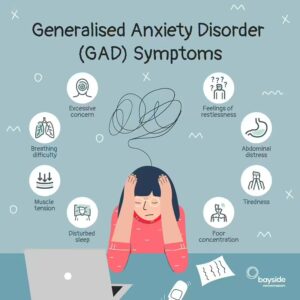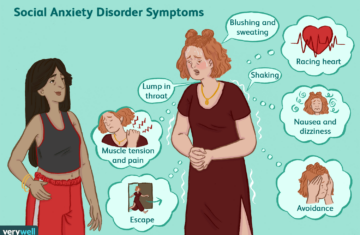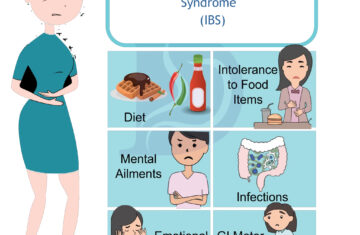
Anxiety is the feeling you have when you think that something unpleasant is going to happen in the future. Other words such as feeling ‘apprehensive’,
‘uncertain’, ‘nervous’ and ‘on edge’ also provide a good description of feelings linked to anxiety.
This is completely normal and something that all human beings experience from time to time, when faced with situations that are difficult or threatening.
Types of Counselors:
There are different types of mental health professionals who can provide counseling for anxiety, including psychologists, licensed counselors, social workers, and psychiatrists. Each has a slightly different focus and training, so it’s important to choose a professional who is best suited to your needs.
Therapeutic Approaches:
Several therapeutic approaches are commonly used to address anxiety. Some of these include:
- Cognitive-Behavioral Therapy (CBT): This is one of the most widely used approaches for treating anxiety. It focuses on identifying and changing negative thought patterns and behaviors that contribute to anxiety.
- Mindfulness-Based Therapies: These approaches, such as Mindfulness-Based Stress Reduction (MBSR) and Mindfulness-Based Cognitive Therapy (MBCT), teach individuals how to be present in the moment and manage their anxiety through mindfulness practices.
- Exposure Therapy: This involves gradually exposing individuals to the situations or triggers that cause anxiety in a controlled and safe environment. Over time, this can help reduce the fear associated with these situations.
- Acceptance and Commitment Therapy (ACT): ACT focuses on accepting difficult thoughts and feelings rather than trying to eliminate them. It helps individuals develop strategies to live a meaningful life despite anxiety.
- Psychodynamic Therapy: This approach explores the underlying emotional and unconscious factors that contribute to anxiety and aims to bring them to the surface for healing.
Initial Assessment:
Once you’ve chosen a counsellor, the first session will likely involve an initial assessment. This is an opportunity for you to discuss your concerns and for the counselor to gather information to develop a treatment plan tailored to your needs.
Duration and Frequency:
The duration and frequency of counselling sessions can vary depending on the individual and the severity of their anxiety. Some people may benefit from short-term counseling, while others may require longer-term therapy.
Homework and Practice:
Many therapeutic approaches for anxiety involve practicing skills and techniques outside of sessions. This might include journaling, mindfulness exercises, or behavioral experiments to gradually face anxiety-provoking situations.
Medication:
In some cases, a counselor may work in conjunction with a psychiatrist who can prescribe medication to help manage anxiety symptoms. This decision would be based on the individual’s needs and preferences.
ANXIETY the word is often used to cover a broad range of experiences and is linked with emotions such as fear and worry. In fact, ‘fear’ and ‘anxiety’ are almost interchangeable terms.
This can at times be a helpful emotion, as it can help you to prepare for events ahead as well as improving your performance. However, anxiety can become so severe and intense at times that it becomes debilitating and starts to restrict daily routine and life as a whole. In essence, at this point, what you experience has got out of proportion and you end up feeling much more anxious than you would expect someone else to be in your circumstances. At this point, you can be said to be suffering from an anxiety disorder. There are many different anxiety disorders (phobias, Obsessive Compulsive Disorder – OCD – panic attacks, etc) that all have anxiety symptoms at their core.
This is an emotion like anger and sadness. Anxiety (sometimes referred to as stress, nerves or fear), plays an important role in the normal functioning of the body; without it we would not be able to function.
Indeed anxiety can be a helpful emotion as it can prepare us for future events as well as improving our performance.
However, when anxiety becomes so severe, intense, disproportionate or overwhelming that it starts to restrict daily routine and life as a whole, it is then anything but helpful and can be disabling and life changing.
When this point is reached, those affected can be said to be living with an ‘anxiety disorder’ of which there are many different types including: panic disorder, social anxiety disorder, agoraphobia, obsessive compulsive disorder (OCD), phobias and post traumatic stress disorder (PTSD).
Despite the numerous forms of anxiety disorder, all have elements in common including physical, psychological and behavioural responses.
Psychological Aspects
The release of adrenaline that is triggered by anxiety also causes psychological symptoms that affect thoughts and feelings. In addition to preparing the body for physical action, adrenaline also motivates people psychologically by prompting specific patterns of thinking. These psychological effects can be seen as what people think, feel and say to themselves when anxious.
Below is a list of common thoughts and feelings experienced by people when anxious:
- Feeling frightened and panicky
- Worrying about losing control/going mad
- Worrying that they might die
- Worrying that they might have a heart attack/
be sick/faint/ have some other illness - Feeling that people are looking at them
and are observing their anxiety - Feeling generally as if things are speeding up
- Feeling detached from their environment and
the people in it - Feeling like wanting to run away/escape from the situation and the people in it
- Generally feeling on edge
- Clock watching
Many of the above thoughts could be summarised as ‘What If’ thoughts. What if this happens? What if I do this? . . .
Remember that seeking counselling for anxiety is a proactive step toward improving your mental health. It’s important to approach the process with an open mind and a willingness to engage in the therapeutic process. Over time, with the guidance and support of a trained professional, you can learn effective strategies to manage and overcome anxiety.




